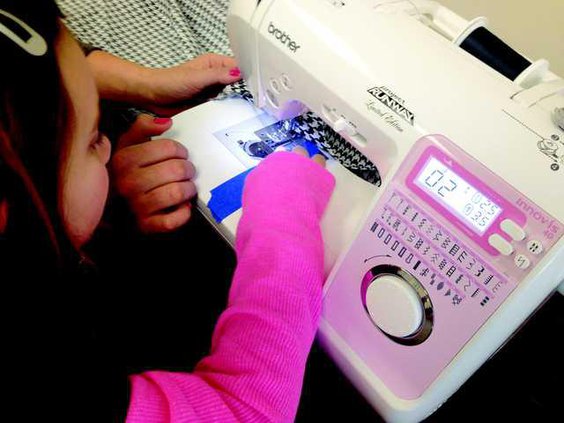Friday afternoon, Lauren Suppes, a member of the Busy Buzzers 4-H club, learned to sew with the help of volunteer Kallie Petersen, a member of the South Bend Jolly Workers 4-H club. It was part of a two-day workshop made possible thanks to a Golden Belt Foundation Youth Engagement Grant.
By providing Suppes and other youth an opportunity to learn to sew and improve their sewing skills, the program not only improves the health and well being of local youth, but also provides a much needed resource for one of the area’s emergency shelters. Basic skills – measuring, pinning, sewing a straight line and serging a finished edge – all go into making pillowcases. These pillowcases will be donated to the Life Giving Center, which houses 16 women and children and eight men in Great Bend. Soon, the shelter will expand to serve young adults ages 18-21 who are aging out of the foster care program.
Kimberly Becker, director of the Life Giving Center, said the pillowcases are a perfect item to offer to Life Giving Center residents.
“It’s something personal that can go with them when they leave the center,” she said.
And the youth are well on their way to finishing their goal of 100 handmade cases over the course of the grant year.
Berny Unruh, Barton County 4-H and youth development director, said kids who learn how to sew show greater creativity, self-esteem, perseverance and problem-solving skills. She pointed to a study by the Home Sewing Association that showed kids ages 8 to 12 showed increased creativity after completing a simple sewing project.
This was only the first of several workshops that will be held. Additional dates are still to be determined, Unruh said.
In order to make the project doable on the scale needed, Unruh applied for and received a grant that helped the Extension office purchase six new sewing machines. Instead of the old-style foot accelerator pedal, the new machines have a push-button to start and stop sewing.
“In the past, we had to find boxes we could put the pedals on so the girls could reach them,” Unruh said. “This is much better.”
The girls agreed. Both Alyssa Habash and Allyson Kaiser were second-year sewers taking part on Friday. They learned on the older machines and found the push button much nicer. But they both enjoyed the serger, which leaves a professional looking finished edge, more.
Prior to receiving the new machines, volunteers struggled to teach skills using a mish-mash of old machines, some easily 40 to 50 years old. The machines had a tendency to break down, Unruh said, and led to plenty of frustration for volunteers and students alike. They were noisy, too. The scene Friday, however, was one of engaged, smiling faces, and the quiet hum of new machines operated by young sewers intent on learning a new skill that they could be proud of. So proud, in fact, more than one asked if they could set aside their completed cases to show to their parents when the afternoon was over.
In order to reach their goal, Unruh welcomes donations of high quality fabric from area sewers. Because these sewers are just learning, they need quality cotton or cotton flannel cloth to work with. Any colors, prints or solids are appreciated. One-yard pieces are ideal, and make a perfect pillowcase. Donations can be brought to the Barton County Extension Office during normal business hours.
“Our vision is to fill a cabinet full of colorful pillow cases from which LGC residents can pick for their own to help with the transitions they are going through,” Unruh said.
Pillowcase Project
Sewing up gifts for Life Giving Center





